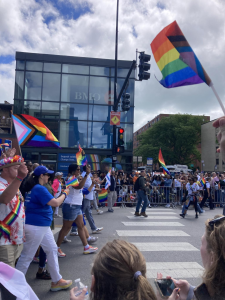DACA under assault from Trump and the U.S. Supreme Court
November 19, 2019
The conservative-majority U.S. Supreme Court appears likely to side with the Trump administration’s agenda of ending the Obama-era’s Deferred Action for Childhood Arrivals (DACA) program, which provides a level of immunity for young, undocumented immigrants currently living and working in the United States. Without DACA protections, over 700,000 DACA recipients will be vulnerable to potential deportation.
Under the DREAMer program, undocumented immigrants illegally brought to the United States as children are able to work and study so long as they meet certain requirements such as passing a background check. However, the Trump administration has long contended that the DACA program has operated on an unconstitutional and illegal platform since its inception in 2012.
Chief Justice John Roberts, who sided with the Supreme Court’s four liberal court justices when considering Trump’s goal of adding a citizenship question to the 2020 census, will once again hold the deciding vote. Roberts, whom many consider to be a conservative moderate, opined that Attorney General William Barr’s argument against DACA’s legality may hold weight due to a similar ruling handed down by the U.S. Court of Appeals for the 5th Circuit in 2016.
Nevertheless, representatives from the Trump administration have emphasized the president’s right to end the program regardless of legality. Solicitor General Noel Fransisco outlined his understanding that the Department of Human Resources reserves the right to continue or end DACA based on discretion. A 90-minute oral argument ensued over whether or not the Trump administration had acted properly when shutting down the DACA program in 2017.
“DACA was a temporary stopgap measure that, on its face, could be rescinded anytime,” said Francisco. “And the department’s reasonable concerns about its legality and its general opposition to broad nonenforcement policies provided more than a reasonable basis for ending it.”
However, three federal appeals courts have already disagreed with the assertion that discretion alone can engineer a complete policy revocation. The three appeals courts ruled that because a reversal on DACA protections would affect so many individuals, businesses and even the U.S. economy, a concrete rationale must be presented that weighs both the pros and cons of revoking DACA protections.
As an Hispanic Serving Institution (HSI), Northeastern Illinois University’s handling of DACA recipients and the challenges they face has been heavily scrutinized. Earlier this semester, NEIU President Dr. Gloria Gibson fielded questions pertaining to the struggles and discriminations faced by undocumented students. In response, Gibson pledged $2,000 toward assisting DACAmented students.
However, Gibson’s $2,000 pledge was criticized as superficial and inadequate, with students contending that such a sum is barely adequate enough to cover the cost of DACA renewals for four students. This year alone, over 300 NEIU students will need to pay for their renewals on top of tuition expenses.
In addition to the university’s Undocumented Student Services staff, NEIU offers an undocumented student resource fund that primarily goes toward covering the cost of student participation at conferences. However, the fund does not cover tuition costs.
According to Director of Undocumented Students Resources and Assistant Dean of Students Luvia Moreno, in order to expand the expenses covered by the resource fund, NEIU would need donations totaling approximately $20,000. Moreno also stated that citizenship status does not disqualify students from pursuing NEIU’s talent scholarships.
However, according to NEIU’s website, undocumented students are ineligible to participate in programs or events funded by state or federal grants. Furthermore, NEIU is not at liberty to dedicate funding toward assisting undocumented students. Nevertheless, 96% of NEIU’s Foundation scholarships and 100% of NEIU’s talent scholarships are not contingent on U.S. citizenship.
As the Trump administration continues to wage war on DACA programs and protections, undocumented students at NEIU will be encumbered by the burden of uncertainty. A fierce contest between the Supreme Court’s liberal and conservative wings will determine the fate of DACA recipients, though Trump’s characterization of DACA recipients as criminals–he tweeted, “Many of the people in DACA, no longer very young, are far from ‘angels.’ Some are very tough, hardened criminals”–will likely create a fissure between an already divided nation.
The Supreme Court is expected to hand down a ruling in spring of 2020.






ERIC LOVE • Nov 19, 2019 at 9:53 pm
The country hasn’t been following any laws on illegal immigration since Reagan now major cities and politician are shielding them it’s bad for the country .I live in the interior of the country so I have a first hand look at the situation.its all about the jobs.I am a African American male and these Democrats are giving the country away to the 3rd world and you are not apart of it.jobs been here.8millon illegal workers that’s the law.